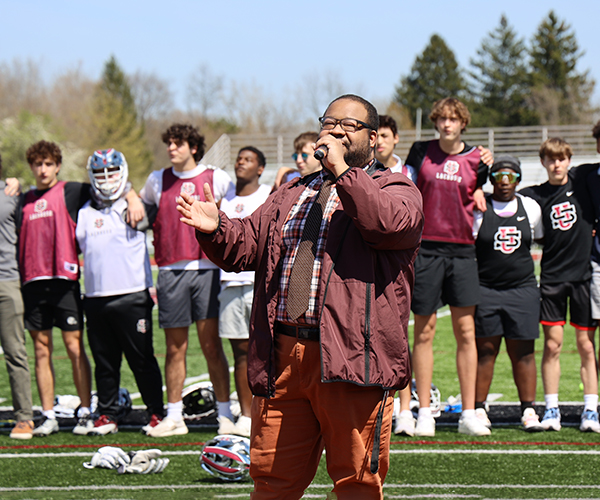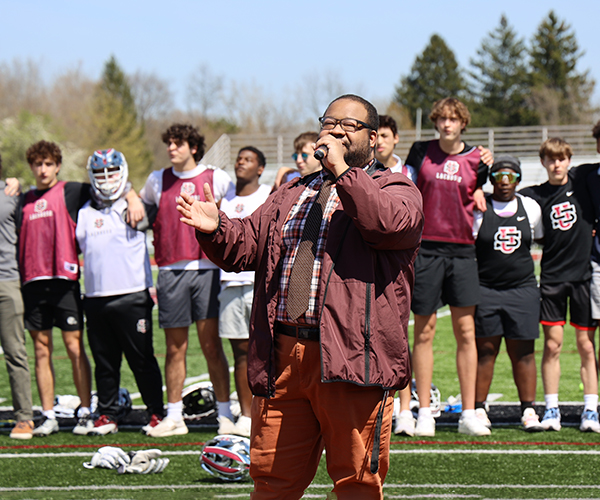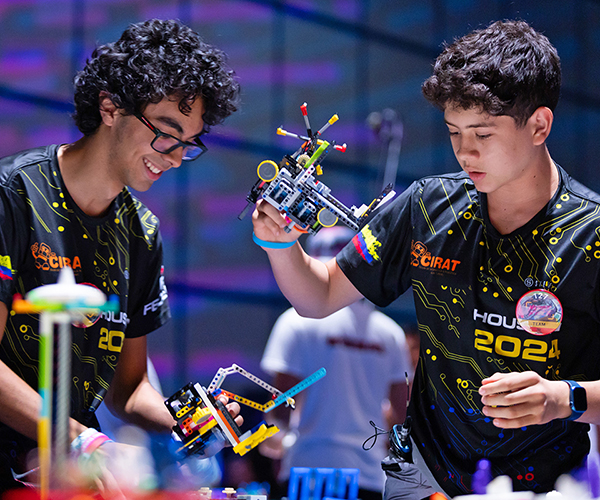When Zach Scott was 19 months old, he went into anaphylactic shock after eating a peanut butter and jelly sandwich.
Since then, his mother, Kathleen, has researched foods that contain peanuts, taught 12-year-old Zach about reading labels and talked with his homeroom teacher about his allergy.
But last year, the Scotts had a scare that made them even more vigilant.
Minutes after entering his art class, where the previous students were working with peanuts, Zach's face and eyes began to puff up, and he had a topical reaction. The art teacher didn't understand what was happening at first because he didn't know Zach had a peanut allergy. The school immediately called Kathleen, not knowing whether to use an EpiPen, an injectable epinephrine (adrenaline) that counteracts any allergic reaction. Even though Zach was OK and didn't need to be medicated, the incident was still a wakeup call for Kathleen, she says. She realized that every person who comes in contact with her son should know about his allergy. If the art teacher had known about it beforehand, the situation may have been prevented, Kathleen says.
Because Bob Scott is not just Zach's father, but also the Avon Lake superintendent, he understands and agrees with the allergy-cautious changes that the school system will be implementing in the fall.
Starting this month, Avon Lake will follow the trend of peanut-free cafeterias in the kindergarten through fourth-grade buildings. This means none of the food will include peanut products, Bob Scott says. The school district will promote peanut-free tables for students with allergies. All of the tables will be wiped down with a cleaner after every student eats to avoid contamination, he says.
Allergies have become an important issue for many schools, and not just because of the potential dangers. The American Academy of Allergy, Asthma and Immunology estimates that students miss about 14 million school days a year because of allergies and asthma.
The Scotts aren't naïve enough to think the Avon Lake measures are foolproof. "My husband's fear is that having peanut-free tables or peanut-free cafeterias gives parents a false sense of security," Kathleen Scott says. "Parents shouldn't fall into this trap; expect the unexpected."
Have a game plan
If you know that your son or daughter has a specific allergy, work with a school nurse and administrator to develop an emergency plan, says Dr. John Carl, a pediatric pulmonologist at Rainbow Babies & Children's Hospital. Also, teach your child to recognize symptoms and how to administer the proper medication, says Dr. Ravi Karnani, an allergy specialist at Summa Health System.
If your child has a food or bee allergy, make sure you provide her with an EpiPen to take to school, Carl says. "They are not like Band-Aids — schools don't have them in bulk," he says.
Having an EpiPen at school isn't enough of a precaution, adds Kathleen Scott. Make sure the pen is somewhere in the school where your son or daughter can get to it in seconds, literally.
Alert staff
Anyone who has direct contact with your child should be aware of his allergies.
"Parents have to be on top of things," says Mara Bendersky, whose 8-year-old daughter, Leia, has a peanut allergy. "You can't assume everyone will just know your kid has an allergy, and you can't assume your kid will tell everyone, either," Bendersky says. She always makes sure the teachers are familiar with the EpiPen procedures.
It's not enough to just tell teachers your child has an allergy — you must explain the effect the allergy can have on your child's behavior as well. Ear trouble is linked with allergies, so your child could have difficulty hearing in class, making it harder for your child to focus and learn, Karnani says. Let teachers know that stuffiness, talking loudly and irritability or crankiness due to lack of sleep from the night before could all be related to allergies, Carl adds. Also, from August to mid-September, ragweed is in full force, and can send your child's symptoms into overdrive. Keep school staff aware that this time of year might be a problem for your child, Carl says.
Evaluate surroundings
School is the one time of day your child is away from home, and it is tougher to control the environment. Help your child make it through the day without a runny nose or an allergic reaction by teaching her to be aware of her surroundings. From the kid sitting next to your child on the bus to musty old books to the floor-cleaning solutions, your child should know what can cause her allergies to flare out of control.
If your child is affected by mold, tell him to avoid carpeted areas that have had water damage. Also, if your child goes outside for gym class, he should watch for decayed, moldy leaves, Carl says.
If your child is overly sensitive to dust, she should sit farther from the chalkboard, because chalk dust could trigger allergies. Your child should be aware of the dust and dirt that can be kicked up during indoor gym classes, Karnani says.
Classroom pets can be a problem if your child is allergic to pet dander. The best thing for a child to do is keep his distance, and if he touches the pet, he should wash his hands immediately. Also, if a lot of children in the class have pets at home, studies have shown that these children carry the dander on their clothes, and it can stick to the seats in the classroom, says Dr. David Lang, head of the Section of Allergy and Clinical Immunology at The Cleveland Clinic.
If pollen is your child's worst enemy, air conditioning in the school can keep things under control, since it can cut pollen counts by 90 percent, Lang says.
Don't smother
Children can get picked on at school enough as it is, and having allergies and being different can be rough. Try to help your child feel as normal as possible, and don't smother her.
Many kids with allergies have a hard time running around outside, but they should try to stay active most of the time, Carl says. Your child shouldn't use allergies as a reason not to participate in activities, he says. When parents are reluctant to let children participate, the children are the ones who suffer.
The best thing you can do for your child is have a positive attitude. Sometimes children with allergies feel isolated because of the medicine or precautions they take that other children don't. Eight-year-old Jack Javorsky takes seven to eight drugs a day, which can be hard for the competitive hockey player who doesn't like to be slowed down, says his mother, Peggy. "I tell him, you have asthma and you are strong," Javorsky says. "My son has hopes to be an NHL star and Dr. Carl says, •Jack, there's no reason you can't be.' "
While Donna Raymond's 12-year-old son, Nick, might feel isolated because he thinks he is the only kid who has to take medicine, he doesn't let that keep him from living a normal life, Raymond says. He runs and plays baseball and basketball. "His biggest problem is that he can't sleep a lot at his school friends' houses because of animals," Raymond says. "I have to tell parents to vacuum their houses before he comes over."
Children with food allergies know what they can't eat, but parents should provide their children with a list of food they can eat, Karnani says. If your child buys school lunches, you should be sure to review the school menu with her, and let her know her options, he says.
Kathleen Scott also tries to keep a level of normalcy with Zach. She makes sure he always has a stash of his own private snacks in his backpack, just in case there is a class party with food he can't eat, she says.
It's hard to deal with all the food limitations, but there are ways around it, Mara Bendersky says. "I live at Mustard Seed Market," she says. Parents just need to be willing to help their child see that allergies can be manageable.
Know child's options/accommodations
Many schools are taking special measures to accommodate kids with allergies, especially food allergies. Parents should be aware of the options and accommodations schools offer. Ask how often air filters are changed, how often they vacuum, if there is air conditioning and what the cafeteria situation is.
Most schools have eliminated peanuts from school lunches, but the kids who are brown bagging it are still a risk, Carl says. "You can't control what the kid sitting next to you has in their lunch," he says.
"If you can't read it, don't eat it"
The best thing for a food allergy is to avoid the food, Lang says. Parents can't just hand their children Benadryl and let them eat whatever they want, Lang says.
Educate your child the best you can, based on age, on what foods are safe, Karnani says. Tell your children if they are unsure of a food, don't eat it.
Kathleen has done a lot of research on foods to see if they contain peanuts, Bob says. "My wife is on a first-name basis with the people at Hershey," he says with a chuckle.
Many food companies aren't required to specify in plain language whether foods contain peanuts, but that will change in January when the Food Allergen Labeling and Consumer Protection Act takes affect.
Zach reads packages all the time now, but in kindergarten he couldn't, Bob Scott says. "We have a rule, if you can't read it, don't eat it," Kathleen adds.



